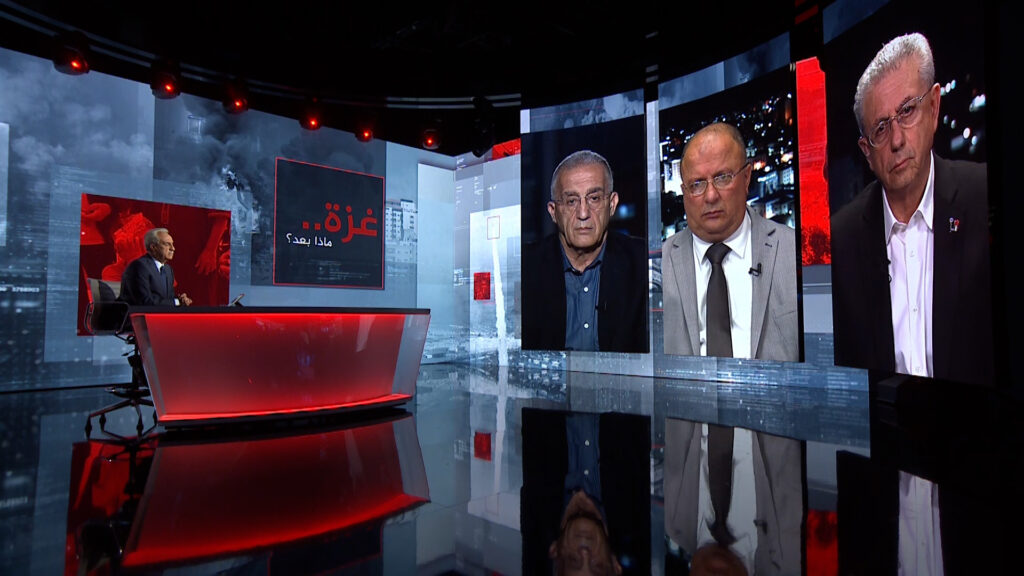Disagreements erupted between the occupation leaders over the day after the war, as Defense Minister Yoav Galant rejected any plans for military rule for the Gaza Strip, in contrast to Prime Minister Benjamin Netanyahu and his partners on the extreme right.
Regarding the reasons for these disagreements, the Secretary-General of the Palestinian National Initiative, Dr. Mustafa Barghouti, says that the steadfastness of the Palestinian people in Gaza, their valiant resistance, and their failure to leave for the Sinai Peninsula as Netanyahu planned, put Israel in the face of a double military and political failure.
Barghouti added – during his talk on the program “Gaza… What Next?” – that among the reasons is also the absence of any Israeli solution to the current crisis, in addition to the fact that “Israel, as a Zionist system and political structure, is turning towards fascism, which increases the intensity of the contradictions in a heterogeneous society.”
As for his prediction of the scenario that is closest to resolving the dilemma of the day after the war, Barghouti pointed out that the strength of the Islamic Resistance Movement (Hamas) and its military wing in 2005 was much less than it is now, and the then Israeli Prime Minister Ariel Sharon was unable to keep his army inside Gaza.
He added, “The resistance will remain as long as the Palestinian people do not leave,” expressing his belief that Israel will not be able to remain inside the Gaza Strip, which will persevere for its freedom. Also, “the Palestinian people will not accept to be ruled by any external force, whether Israel or an international party, and it is they who will decide their fate.”
According to Barghouti, Netanyahu dreams of a continuous military operation for years during which the necessities of life in Gaza are destroyed in the hope of pushing the Palestinians to leave to implement his plans to ethnically cleanse the Gaza Strip and then the West Bank.
He stressed that October 7 was not a cause, but rather a result of 76 years of the Nakba, displacement, and occupation of the Palestinian territories, stressing that Israel has never invoked a justification for exercising its oppression, “as the occupation is the reason for everything.”
At the end of his speech, he concluded that Israel will remain in the same impasse, deep crisis, and intractable dilemma after the Battle of Rafah, adding that there is no solution other than ending the occupation and the system of colonial settler colonialism.
What does military rule mean?
In turn, the military and strategic expert, Brigadier General Elias Hanna, said that any military rule in Gaza “means submission to the Israeli emergency law. The ruler and the system are purely military, and are dealt with from a security perspective, such as monitoring the sleeper cells of Hamas and the resistance factions.”
Hanna pointed out that this type of government excludes anything political or civil, as everyone is under military authority, but he added that Gaza’s militarily steadfastness creates major strategic problems for Israel.
The strategic expert described the Gallant Project, which is based on local Gazan parties controlling the Gaza Strip with international accompaniment, as ridiculous and unachievable, and that “any international project cannot be talked about before eliminating Hamas, which has not been achieved so far.”
However, Gallant is responsible for protecting the army and its morale, and stands between it and Netanyahu – according to Hanna – who pointed out that the army, which has been fighting for more than 7 months, is not accustomed to these fierce battles, and has been unable to achieve any tactical, operational or strategic achievement that can be presented to the political leadership.
These are the plans of Netanyahu and his partners
For his part, Adel Shadid, a researcher specializing in Israeli affairs, believes that the controversy and discussion that went beyond closed rooms between the government and the military and security services “confirms that there is almost consensus, with the exception of Netanyahu and his ministers Itamar Ben Gvir and Bezalel Smotrich, that the war has led Israel to a major impasse.”
Shadeed believed that “there is no possibility of resolving the current crisis, which reflects the military level’s conviction that Israel is in trouble,” pointing out that Gallant’s change in position stems from the fierce resistance in Gaza.
He pointed out that Netanyahu is not interested in discussing any political issue because there is a decision not only to reoccupy Gaza but also to return settlement there. He is also trying to move the discussion from the war council to the mini-security council with a right-wing majority.
He points out that Gallant’s last speech was not in the name of the government and the political decision, but rather in the mouth of the military establishment, before indicating that there is an agreement between Netanyahu and his right-wing partners to take quick measures to ensure that no Palestinian entity is established in the future.

